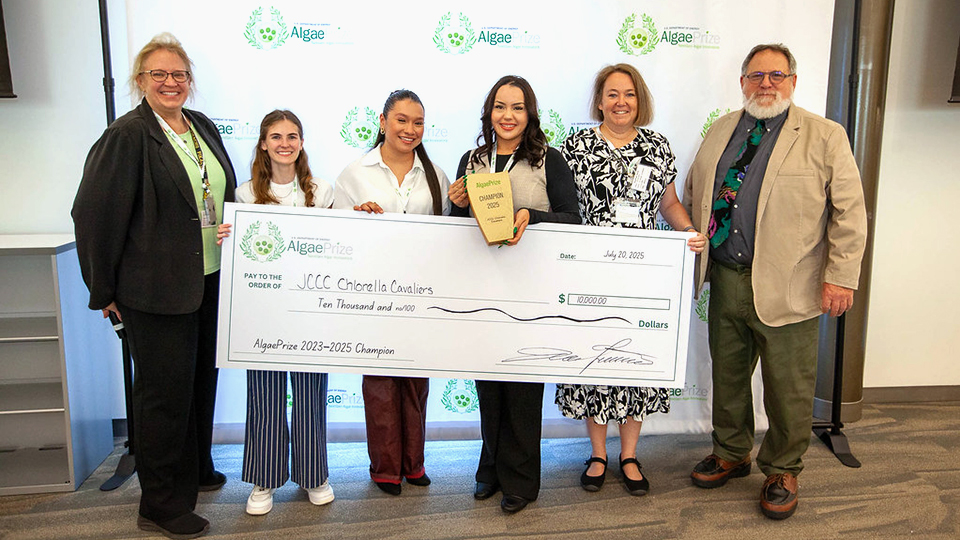September 5, 2025
Team’s scientific breakthrough earns accolades, plus a $10,000 prize.
When Biology Professor Dr. Heather Seitz invited students to join a volunteer research team, she never imagined their work would shine on a national stage.
The Chlorella Cavaliers, a group of JCCC students passionate about science, set out to do something never done before: introduce DNA into Chlorella vulgaris algae to help it break down type 1 plastic more effectively and improve water quality in ecosystems.
Led by Seitz, team members Cheyenne Howard (captain), Clover Tyler, Helen Lagunas, Will Walker, and Ashton Madoumba spent months experimenting, problem-solving, and pushing the boundaries of science. Their innovative work carried them to the U.S. Department of Energy’s AlgaePrize competition, where they presented alongside teams from colleges and universities across the nation.
Champions on a national stage
At the three-day conference held at the National Renewable Energy Lab in Golden, Colorado, JCCC’s Chlorella Cavaliers impressed a panel of expert judges. Out of 15 semifinalist teams, they were named one of five national champions. They also won the award for Best Video, plus $10,000 in prize money.
Even more remarkable: JCCC was the only community college among the champions. Their competitors included graduate-level teams from four-year universities.
"Our students showed what is possible to accomplish in the first two years of college,” said Seitz. “They accomplished amazing research, created a professional video, and were able to successfully answer questions from the judges. I couldn't be more proud of the work they put in.”
From classroom to cutting-edge research
The Chlorella Cavaliers’ journey began when the AlgaePrize call for proposals invited students nationwide — from high school through graduate school — to design new technologies for the algae industry. Out of hundreds of entries, JCCC’s proposal stood out. The team received funding for research and travel, and their results proved their modified algae could outperform traditional strains in breaking down plastic.
JCCC’s modern science classrooms and labs aided in the team’s success, providing professional-grade equipment and collaborative space for advanced projects.
“The updates to the STEM facilities have opened so many possibilities for innovative instruction,” said Dr. Mary Wisgirda, Dean of Mathematics and Sciences. “The new and updated classroom and lab facilities enable faculty to better prepare students for advanced research opportunities at four-year institutions and give students experience with equipment they may encounter in the workplace.”
A culture of STEM excellence
Opportunities like the AlgaePrize aren’t rare at JCCC. Each semester, students showcase original projects at the Course-based Undergraduate Research Experience (CURE) Symposium in the fall and the STEM Poster Symposium in the spring. These events mirror professional scientific conferences, giving students valuable presentation experience.
JCCC also supports future scientists through the STEM Scholars program, which awards up to $10,000 a year for two years to eligible students studying STEM fields at JCCC, including:
- Physical Sciences
- Mathematical Sciences
- Computer and Information Sciences
- Geosciences
- Engineering
- Biological Sciences (non-clinical)
STEM Scholars receive more than financial support. They’re paired with faculty mentors, guided by STEM counselors on transfer pathways, and often participate in on-campus and university-partnered research.
Ready to take the next step?
At JCCC, students don’t just learn science, they do science. With small class sizes, supportive faculty, modern facilities, and resources like free tutoring, Cavaliers are prepared to succeed in any field they pursue.
You belong here.

